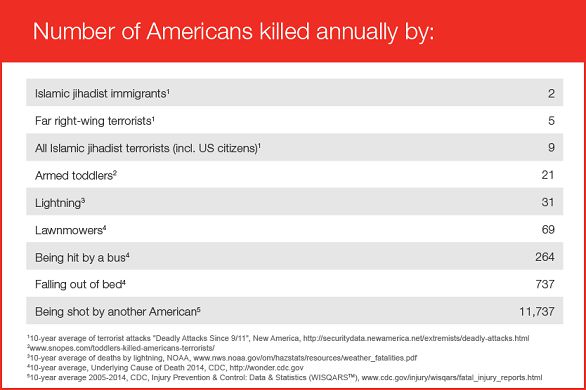Why statistical offices should hire a comedian

OECD
Chart for article Why statistical offices should hire a comedian
Did you know that each year in the United States nearly 730 people die falling out of bed, while only nine are killed by jihadist terrorists? If you had to guess, which one do you think Americans are more worried about?
The late statistician Hans Rosling argued that we are victims of the “fear instinct”, which explains why things that frighten us are more likely to grab our attention. Just think about how often politicians on all sides have worked on people’s fears to turn public opinion against migration, for example.
In an age where misinformation spreads on social media with the click of a mouse, stories about the danger of vaccinations, the myth of climate change or other flat-earth conspiracies have challenged the relationship between perceived realities, objective truth and official statistics. Groups on social media become echo chambers in which members start believing an argument if it is simply repeated often enough. When surrounded by people with similar views, whether on social media or in person, those gut feelings become reinforced.
Perhaps it is because the expert community has not come up with compelling and easy-to-understand narratives that strike a chord with people’s feelings and concerns. The danger is, while experts need to make value judgments on measurement criteria and frameworks, in a polarised society these can be misused by populists who dismiss experts as partisan without any “real world” understanding. Such factors are proving to be a critical challenge for democracy and public institutions.
How can statisticians turn the tables? Let’s start by recalling what they do. The mandate of official statistical offices is to produce reliable information about a society in its entirety, based on the Fundamental Principles of Official Statistics. The information should be data driven, based on reliable methodologies, and pave the way for informed discussion, decision and action. In an ideal world, statisticians should remain dispassionate and objective, as their role is to engage in the science of data collection and analysis itself, not to make judgments about the data that they collect.
Listen up, pay attention–
Statisticians need to realise how their facts can be interpreted differently by various groups. Actively engaging with users and listening to their arguments also helps statisticians become better at reviewing their own facts in light of new realities. Doing this can help remove the accusation that experts inhabit an ivory tower, and can win back the trust they need to function effectively.
They must therefore adopt a user-centric focus rather than churning out numbers that do not provide citizens with a clear understanding of where the data came from, what they are for or what the government will do with them. Using new channels and forms of data dissemination will be key. The UK Office for National Statistics’ recent efforts to make housing planning statistics more coherent and comparable by forging links between various groups is a good example of this.
The statistical community has a huge chance to team up more directly with citizen groups at the local level to address issues of concern to people such as public transport, sport facilities, education and other areas linked to public services. Empowering citizens to use data and statistics in a responsible way is key. This could also involve providing statistical literacy training to civil society and the media. Statistics Canada is providing civil society groups with a tool to improve the quality of their own citizen-generated data. Statistics Netherlands has also reoriented itself towards bringing data to the consumer rather than producing data for the sake of it, and has even launched their own TV studio. More initiatives like this are needed, as well as others that create opportunities for statisticians to listen to the concerns and aspirations of citizens.
–and smile
Responding to people’s emotions is another key part of the answer.
This does not mean becoming angry, for one of the surest ways to reinforce someone’s prejudices is to attack him or her. On the contrary, why not use humour?
Political satire programmes on television, such as the Daily Show with Trevor Noah and Last Week Tonight with John Oliver, draw millions of viewers. Politicians often appear on popular comedy TV programmes and talk shows to get closer to their constituencies. Popular Youtubers such as Cyprien in France or Charges in Brazil also use humour to comment on current affairs. Like the TV shows, they put news and information into a format that is engaging and appeals to a wide audience. It’s no wonder they have become a primary source of political news for millennials. Can statistical offices learn from this approach? Or even better: could they take part in it?
Creating funny and light-hearted narratives around statistics would get more people interested in how statistics are produced and used, and help engage statisticians in public discussions. From busting myths to addressing bias on all sides, humour can also help stop misleading and confusing information from spreading further.
Truth is no laughing matter, but perhaps we can use humour to get the truth out, for the good of science and society.
Durand, M. (2016), ”Figures and feelings both count, as a matter of fact”, in OECD Yearbook 2017, OECD Publishing, Paris, https://www.oecd.org/internet/figures-and-feelings-both-count.htm https://www.oecd.org/internet/figures-and-feelings-both-count.htm
Hendricks, V. (2017), ”How to stop the slide from info-storms to post-factual democracy”, in OECD Yearbook 2015, OECD Publishing, Paris, https://oe.cd/1V- https://oe.cd/1V-
Jutting, J. (2013), ”Measuring development goals: Towards a data revolution”, OECD Observer, OECD Publishing, Paris, https://oe.cd/obs/2CF https://oe.cd/obs/2CF
Sutherland, P. (2015), ”We must harness the true strength of migration”, in OECD Yearbook 2015, OECD Publishing, Paris, https://oe.cd/2CF https://oe.cd/2CF
